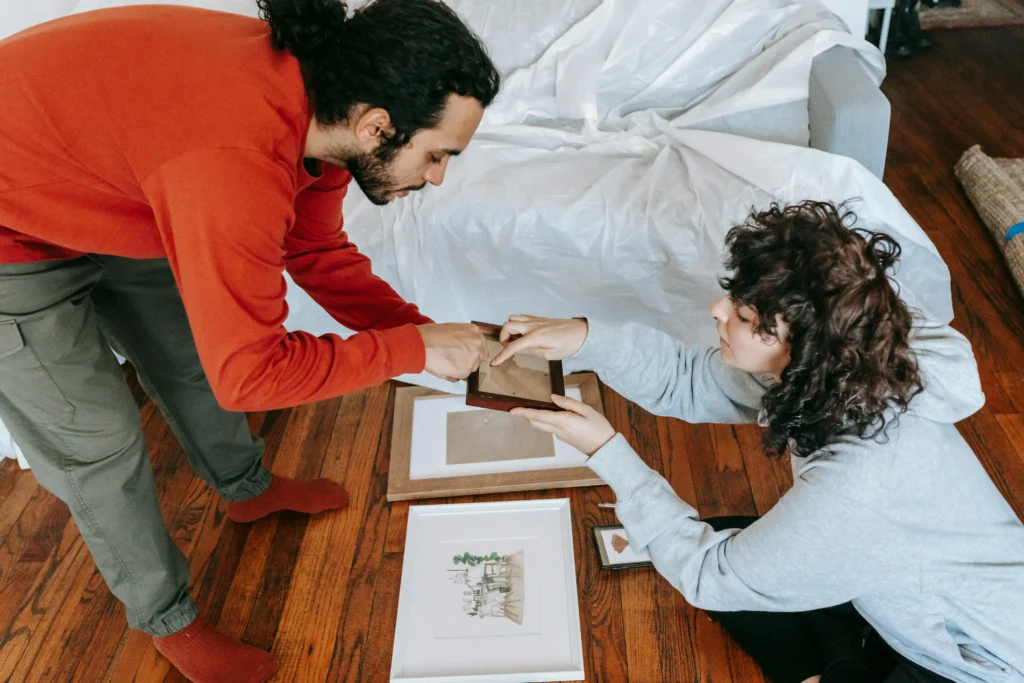22 Deep Questions To Ask Your Partner
Building deeper intimacy requires moving beyond surface conversations about daily schedules and weekend plans.
These thoughtful questions create opportunities for vulnerability, understanding, and genuine connection with your partner.
Use them during quiet moments together to discover new layers of each other’s hearts and minds.
1. “What’s a childhood memory that still influences how you see the world today?”
Childhood experiences shape our adult perspectives in profound ways.
This question invites your partner to share formative moments that continue to impact their worldview, values, and reactions to current situations.
Their answer might reveal why they value security, why they’re passionate about justice, or why certain situations trigger strong emotional responses.
Understanding these foundational experiences helps you support them more effectively.
Listen for both positive and challenging memories.
A beloved grandmother’s wisdom might explain their generous nature, while a difficult family situation could illuminate their need for stability in relationships.
This conversation often leads to deeper discussions about family dynamics, core beliefs, and the experiences that made them who they are today.
2. “What dream do you have that you’ve never told anyone about?”

Secret dreams reveal our deepest desires and aspirations.
When your partner shares something they’ve kept private, they’re offering you access to their most vulnerable hopes and fears about the future.
These hidden dreams might seem impractical, embarrassing, or impossible to others, which is why they’ve remained secret.
Your response to their vulnerability sets the tone for future intimate conversations.
Perhaps they dream of writing a novel, starting a nonprofit, traveling to remote places, or making a significant career change.
These aspirations often reflect their authentic self beneath societal expectations and practical limitations.
Creating a safe space for dream-sharing strengthens trust and intimacy.
Your support and encouragement for their secret aspirations can become a powerful force in your relationship.
3. “What’s your biggest fear about our relationship?”

Addressing relationship fears directly prevents small anxieties from growing into major problems.
This question requires courage from both partners but creates opportunities for reassurance and problem-solving together.
Their fears might involve commitment, compatibility, external pressures, or past relationship patterns they worry about repeating.
Bringing these concerns into the open allows you to address them as a team.
Common fears include growing apart over time, not being good enough for each other, repeating family patterns, or facing external challenges that could strain your bond.
Your response to their vulnerable sharing determines whether they feel safe bringing future concerns to you.
Listen without defensiveness and focus on understanding their perspective completely.
4. “How do you want to be comforted when you’re going through a difficult time?”

People need different types of support during challenging periods.
Some want advice and solutions, others need space to process, and many simply want to feel heard and understood without judgment.
Understanding your partner’s comfort preferences prevents you from accidentally making difficult situations worse by offering the wrong type of support.
This knowledge becomes invaluable during future crises.
They might prefer physical comfort like hugs and cuddling, verbal reassurance, practical help with tasks, or simply your quiet presence while they work through emotions.
Learning their comfort language helps you show love more effectively during their most vulnerable moments.
This understanding strengthens your role as their primary source of support and security.
5. “What accomplishment are you most proud of that others might not consider significant?”
Personal pride often stems from overcoming internal struggles or achieving goals that others can’t see or appreciate.
This question reveals what truly matters to your partner beyond external recognition.
Their answer might involve conquering a fear, developing self-discipline, healing from past trauma, or making difficult but necessary life changes.
These quiet victories often require tremendous courage and effort.
Perhaps they’re proud of setting boundaries with difficult family members, overcoming social anxiety, developing patience, or learning to trust again after betrayal.
These achievements shape character profoundly.
Celebrating these private victories with your partner validates their growth and shows you recognize their efforts toward becoming their best self.
6. “What’s something you believe about love that most people would disagree with?”
Love philosophies vary dramatically between individuals based on their experiences, observations, and values.
This question explores your partner’s unique perspective on romantic relationships and what makes them work.
Their unconventional beliefs about love might challenge your assumptions and create opportunities for deeper understanding.
Perhaps they believe love requires work rather than feeling effortless, or that independence strengthens rather than threatens relationships.
These discussions often reveal core relationship values and expectations.
Understanding their love philosophy helps you navigate disagreements and align your approaches to building a strong partnership.
Sharing unconventional beliefs requires vulnerability since they risk judgment or disagreement.
Your curiosity and respect for their perspective encourage continued openness about important topics.
7. “What’s a mistake you made that taught you something valuable about yourself?”

Mistakes often provide our most profound learning opportunities.
This question invites your partner to share how failures or poor decisions led to personal growth and self-awareness.
Their story might involve career missteps, relationship failures, financial decisions, or personal choices that had negative consequences but ultimately contributed to their wisdom and maturity.
Understanding their learning process helps you appreciate their current strengths and perspectives.
You’ll better understand why they approach certain situations cautiously or why they value specific principles.
This conversation also reveals their ability to take responsibility, learn from experiences, and grow from adversity—all important qualities in a long-term partner.
8. “What does your ideal ordinary day look like five years from now?”

Dreams about the future often focus on extraordinary achievements, but daily life happiness depends on ordinary moments and routines.
This question explores their vision for everyday contentment and lifestyle preferences.
Their ideal day might include family breakfast, meaningful work, evening walks together, cooking dinner, or quiet reading time. These details reveal their values and priorities for future happiness.
Understanding their vision helps you determine compatibility in lifestyle preferences, family goals, and daily rhythms.
Do their ordinary day dreams align with your own hopes for the future?
This conversation often leads to practical discussions about career goals, family planning, living situations, and how you want to spend your time together long-term.
9. “What’s something you wish you could tell your teenage self?”
Reflecting on teenage years often reveals how much growth and wisdom your partner has gained through experience. Their advice to their younger self illuminates current values and hard-won insights.
They might wish they could encourage their teenage self to worry less about others’ opinions, take more risks, develop confidence earlier, or appreciate family relationships more deeply.
This question often uncovers regrets, lessons learned through difficulty, and perspectives that took years to develop. Understanding their journey to self-acceptance and wisdom deepens your appreciation for who they’ve become.
Their answer also reveals what they value most now—confidence, authenticity, relationships, or personal growth—based on what they wish they had understood earlier.
10. “What’s the most difficult decision you’ve ever had to make?”
Life’s hardest decisions often involve choosing between competing values or important relationships. This question explores how your partner navigates complex moral and emotional terrain.
Their difficult decision might have involved family relationships, career choices, moral dilemmas, or personal sacrifices that required tremendous courage and created lasting impact on their life direction.
Understanding their decision-making process during crisis reveals their core values, problem-solving approach, and ability to handle pressure. These insights help you support them during future difficult choices.
This conversation often leads to discussions about values, priorities, and how they balance competing demands in life—all crucial information for building a strong partnership.
11. “What’s something you’re curious about but haven’t had the chance to explore?”
Unexplored interests reveal hidden aspects of your partner’s personality and potential areas for growth and adventure together. Their curiosity might surprise you and open new possibilities for shared experiences.
They might be curious about learning a new language, exploring different cultures, developing artistic skills, understanding scientific concepts, or pursuing spiritual practices.
These unfulfilled curiosities often represent parts of themselves they haven’t fully developed due to time constraints, practical limitations, or lack of opportunity and encouragement.
Supporting their curiosity and possibly exploring new interests together can add excitement and growth to your relationship while helping them become more fully themselves.
12. “What’s a tradition from your family that you want to continue, and one you want to change?”
Family traditions shape our expectations for relationships, holidays, and daily life.
This question explores which elements of their upbringing they value and which they want to modify or eliminate.
Positive traditions might include holiday celebrations, communication styles, work ethics, or approaches to friendship and community involvement that enriched their childhood experience.
Traditions they want to change might involve conflict resolution patterns, emotional expression, gender roles, or other family dynamics that didn’t serve their well-being or growth.
Understanding their perspective on family patterns helps you navigate relationships with their family and make conscious choices about your own traditions together.
13. “What’s something you’ve always wanted to learn but felt too intimidated to try?”
Fear of failure or judgment often prevents us from pursuing interests that could bring joy and fulfillment.
This question reveals areas where your partner feels vulnerable but curious.
Their intimidating interest might involve creative pursuits like music or art, physical challenges like dancing or sports, intellectual topics like philosophy or science, or practical skills like cooking or woodworking.
Understanding their learning fears helps you offer encouragement and support.
Perhaps you could explore these interests together, making the intimidating feel more approachable and fun.
Your belief in their ability to learn and grow can become a powerful force that helps them overcome self-imposed limitations and discover new sources of joy and confidence.
14. “What’s the most important lesson your parents taught you, intentionally or unintentionally?”
Parental influence shapes our relationship patterns, communication styles, and core values in lasting ways.
This question explores both positive and negative lessons that continue to impact their adult life.
Intentional lessons might involve work ethic, kindness, integrity, or resilience that parents deliberately modeled and taught through words and actions.
Unintentional lessons often prove equally powerful—perhaps they learned to value emotional expression after experiencing its absence, or developed independence after seeing unhealthy dependence patterns.
Understanding these foundational lessons helps you appreciate their strengths and triggers while building awareness of patterns you both might want to continue or change.
15. “What’s something you’re struggling with right now that you haven’t talked about?”
Hidden struggles create distance in relationships even when partners love each other deeply.
This question creates space for your partner to share current challenges they might be processing privately.
Their struggle might involve work stress, family concerns, personal insecurities, health worries, or spiritual questions they’re reluctant to burden you with or don’t know how to articulate.
Creating safety for struggle-sharing strengthens intimacy and allows you to provide appropriate support.
Sometimes simply feeling heard and understood provides tremendous relief.
Your response to their vulnerability determines whether they’ll continue bringing struggles to you in the future.
Listen with compassion and avoid immediately offering solutions unless requested.
16. “What does forgiveness mean to you, and how do you know when you’ve truly forgiven someone?”
Forgiveness philosophies vary dramatically and significantly impact relationship dynamics.
This question explores your partner’s approach to healing from hurt and moving forward after betrayal or disappointment.
Their forgiveness process might involve releasing resentment, rebuilding trust gradually, setting new boundaries, or finding peace without necessarily reconciling with the person who hurt them.
Understanding their forgiveness style helps you navigate future conflicts and mistakes.
Do they need time and space to process hurt, or do they prefer immediate discussion and resolution?
This conversation often reveals past hurts that shaped their forgiveness philosophy and current relationships that need healing or boundaries.
17. “What’s something about yourself that you’re still learning to accept?”
Self-acceptance represents an ongoing journey rather than a destination.
This question explores areas where your partner continues to work toward peace with aspects of their personality, appearance, or life circumstances.
They might be learning to accept physical features, personality traits, family background, past decisions, or current limitations that they once viewed as flaws or obstacles.
Understanding their self-acceptance journey helps you offer appropriate support and avoid inadvertently reinforcing negative self-perceptions they’re working to overcome.
Your unconditional acceptance of these aspects can become a healing force that helps them develop greater self-compassion and confidence.
18. “What’s the most meaningful compliment you’ve ever received?”
Meaningful compliments often recognize qualities or achievements that matter deeply to the recipient.
This question reveals what types of recognition touch your partner’s heart and what they most want to be known for.
The compliment might have acknowledged their character, talents, growth, impact on others, or qualities they work hard to develop, but worry others don’t notice.
Understanding what recognition means most to them helps you affirm them more effectively.
Do they value acknowledgment of their efforts, their character, their talents, or their impact on others?
This conversation also reveals their core values and the aspects of themselves they most want to be seen and appreciated for by others.
19. “What’s something you wish people understood about you that they often miss?”
Misunderstanding creates loneliness even in close relationships. This question explores aspects of your partner’s personality or experience that others frequently misinterpret or overlook.
Perhaps they appear confident but struggle with insecurity, seem social but need significant alone time, appear tough but feel deeply, or seem spontaneous but actually prefer structure.
Understanding these hidden aspects helps you see them more accurately and respond to their true needs rather than surface appearances.
Your ability to see and understand their authentic self becomes a source of deep connection and relief from the exhaustion of feeling misunderstood.
20. “What’s something you hope we never lose in our relationship?”
Identifying current relationship strengths helps preserve them as life changes and challenges arise.
This question explores what your partner values most about your connection and wants to protect.
They might treasure your shared humor, physical affection, deep conversations, spontaneous adventures, mutual respect, or the safety they feel being completely themselves with you.
Understanding what they most value helps you prioritize maintaining these elements during busy seasons or difficult periods when some relationship aspects might naturally receive less attention.
This conversation reinforces positive patterns and creates shared commitment to preserving your relationship’s most precious qualities.
21. “What’s a risk you want to take but haven’t found the courage for yet?”
Hidden courage desires reveal untapped potential and areas where your partner might benefit from encouragement and support.
Their risk might involve career changes, creative pursuits, relationship decisions, or personal growth challenges.
Understanding their courage barriers helps you provide appropriate support.
Do they need practical planning, emotional encouragement, accountability, or simply someone who believes in their ability to succeed?
Perhaps they want to start a business, move to a new city, pursue additional education, heal damaged relationships, or make significant lifestyle changes that feel overwhelming alone.
Your belief in their capability and willingness to support their risk-taking can become a powerful force that helps them pursue meaningful goals and dreams.
22. “What’s something you want us to experience together that we haven’t yet?”
Shared dreams create excitement and direction for your relationship’s future. This question explores adventures, goals, or experiences your partner wants to pursue together as a couple.
Their vision might involve travel destinations, learning experiences, service projects, family goals, home improvements, or personal growth challenges you could tackle together.
Understanding their shared experience desires helps you plan your future and creates anticipation for new adventures.
It also reveals what types of activities they value and want to associate with your relationship.
This conversation often leads to specific planning and goal-setting that transforms dreams into concrete steps you can take together toward a more fulfilling partnership.
Conclusion
These meaningful questions create opportunities for deeper connection, understanding, and intimacy that strengthen your relationship’s foundation and future growth together.


![Why Do Guys Lose Interest After They Sleep With You? [11 Reasons]](https://havenchic.com/wp-content/uploads/2025/07/COVER-25-768x512.webp)




